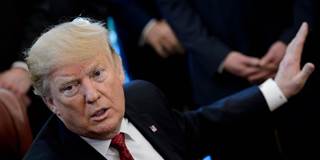Although Donald Trump is not the first US president to have reservations about America's spies, he is the first to attack the intelligence community so openly. As US intelligence analysts' job becomes ever more difficult, other national-security policymakers must support them in providing in-depth, fact-based assessments.
ATLANTA – For more than two years, US President Donald Trump has heaped praise on the world’s authoritarians, disrespected America’s democratic allies, and pursued an ego-driven effort to solve the Gordian knot of North Korea’s nuclear weapons program. But now, the effects of Trump’s demented foreign policies are coming home to roost. Nowhere is this more evident than in the United States’ intelligence agencies, where professionals charged with safeguarding the country’s national security are struggling to acquaint the president with realities he does not want to see.
Following the annual threat briefing to Congress in January, Trump issued a flurry of tweets challenging the credibility of his own intelligence chiefs’ testimony. Though the content of these tweets was characteristically sophomoric, it would be a mistake to dismiss them as a mere tantrum from the Toddler in Chief. Trump’s petulance bears directly on the intelligence community’s ability to do its job.
Trump’s intent in undermining his own intelligence chiefs is hard to miss. Unnamed White House sources recently suggested to reporters that Trump is eager to be rid of Dan Coats, the director of national intelligence. By quickly dismissing reports about intelligence officials’ testimony as “fake news,” Trump delivered an important message to Coats: his job depends not on his performance, but on his willingness to carry water for the president.

ATLANTA – For more than two years, US President Donald Trump has heaped praise on the world’s authoritarians, disrespected America’s democratic allies, and pursued an ego-driven effort to solve the Gordian knot of North Korea’s nuclear weapons program. But now, the effects of Trump’s demented foreign policies are coming home to roost. Nowhere is this more evident than in the United States’ intelligence agencies, where professionals charged with safeguarding the country’s national security are struggling to acquaint the president with realities he does not want to see.
Following the annual threat briefing to Congress in January, Trump issued a flurry of tweets challenging the credibility of his own intelligence chiefs’ testimony. Though the content of these tweets was characteristically sophomoric, it would be a mistake to dismiss them as a mere tantrum from the Toddler in Chief. Trump’s petulance bears directly on the intelligence community’s ability to do its job.
Trump’s intent in undermining his own intelligence chiefs is hard to miss. Unnamed White House sources recently suggested to reporters that Trump is eager to be rid of Dan Coats, the director of national intelligence. By quickly dismissing reports about intelligence officials’ testimony as “fake news,” Trump delivered an important message to Coats: his job depends not on his performance, but on his willingness to carry water for the president.